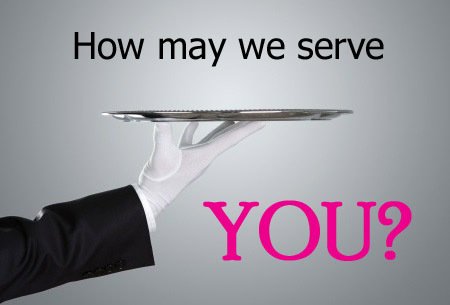How to Empower Your Business - Focusing on Your Customers

The key to all business is to remember first and foremost that CUSTOMERS are what all business is based upon. The primary foundation of business, no matter what market you are in, is your customer base. The fundamental key is to turn the consumers within your market reach into customers by focusing more management time and energy into carefully empathizing with and putting yourself in their shoes, so as to first and foremost understand them, their needs and wants, in order to best provide them with what they most want and need. Without customers, there would not be any business at all, because business is essentially built upon the foundation of providing goods and services to that very foundation of real human beings who consume those goods and services. Thus, thinking outside of the box in bold and innovative ways in this day and age of one of the most challenging times in business is to return to this primary foundation of what all business is based upon by empathizing with customers in order to make them priority number one.
One of the first keys is the customer. Customers want the best product at the best price and want to be treated well in the process of buying and owning that product or service. Customers choose the business that best treats them like a real "human being". It is the "human touch" that stands out in the mind, as well as memory of customers.

In today's consumer driven economy there is the tendency to call the customer a "consumer", which is a more depersonalized expression. A consumer is a person who uses any product or service. Typically when business people and economists talk of consumers they are talking about a person as consumer, an aggregated commodity item with little individuality other than that expressed in the buy/not-buy decision. However there is a trend in marketing to individualize the concept. Instead of generating broad demographic profile and psychographic profiles of market segments, marketers are engaging in personalized marketing, permission marketing, and mass customization.

The word, "customer" derives from "custom," meaning "habit"; a customer was someone who frequented a particular shop, who made it a habit to purchase goods of the sort the shop sold there rather than elsewhere, and with whom the shopkeeper had to maintain a relationship to keep his or her "custom," meaning expected purchases in the future. The word did not refer to those who purchased things at a fair or bazaar, or from a street vendor.
Over 80% of customer initiatives are focused on how to "sell the customer better" through matching products to customers rather than investing more resources in "treating customers better". The resources applied to "selling the customer better" for specific customer initiatives have little impact on a customer’s future decision to buy during subsequent campaigns whereas resources applied to "treating the customer better" have a strong annuity effect on successive campaigns.

The "human touch" should not be confused with the popular but misconceived notion publicized by most businesses that they have customer "relationships" or seek customer "intimacy". The truth is that most customers don’t want what the word "relationship" or "intimacy" implies – a certain degree of closeness or meaningfulness regarded by most as offensive and intrusive. Customers want and need something more akin to an "understanding". An understanding has certain emotionally based expectations and exchanges without the implied closeness and meaningfulness suggested by the word "relationship".
Research has shown that this "understanding" is based on three primary human needs of customers and the resulting expectations:
- Acknowledgement
- Respect
- Trust
The genius behind every successful business transaction is to recognize and leverage the power of the human touch with customers. True successful Business Innovation puts itself in the customer's shoes. Without customers there would be no sales or business at all. How and why customers choose to buy, both initially and with follow-up purchases, is simple. Here is a snapshot of how customers buy as "real people" (through their own eyes):
- Build trust in me so I feel buying your product is the best decision for me.
- Acknowledge me and my importance to you.
- Respect me and my needs.
Initial trust is either confirmed and strengthened or is disproved and decreased based on the customer’s experience.
The following questions and how well a firm both answers them and implements their answers represent the major challenges a firm will have when evolving its "human touch" in its Business Innovation:
What needs do customers have as people that will most influence their decision to buy?
What leadership behavior best creates a firm and its culture to fulfill those needs?
What types of employees best fulfill those needs?
What employee behavior best communicates and fulfills those needs?
What training best enhances those employees’ innate abilities?
What communication methods and skills best deliver the desired messages?
What employee treatment best enhances both employee and customer fulfillment?
What approaches best create human touch consistently across each interaction?
What processes best deliver a consistent human touch?
What technology approaches maximize humanness, and do not dehumanize?
Any business can begin the journey to develop its human touch with small and simple actions that cost nothing yet have immense and immediate impact on customers. This journey could begin with the simplicity of a smile, direct eye contact, and the words "please" and "thank you". Encouraging employees to use these simple behaviors with customers more often and with genuine warmth will make all the difference in what the customer remembers about the business.
These simple actions communicate the message of "you are a real person and we care about you". Customers remember these little human touches because that’s what is important to them as a customer and as a person. These human touches satisfy the three primary human needs that impact the customer’s decision to buy – Acknowledgement, Respect, and Trust (ART).
Again, without customers there would be no sales or business at all. Therefore, customers should always come FIRST.
Even inherently shy employees can work well if they are considered to be a "people person", (i.e. enjoy being around people and helping them). Employees should have a natural, innate desire to help customers, as this desire is the foundation for service excellence. "People" people like people (customers) and customers are more likely to like them in return. Employees who genuinely enjoy human interaction are increasingly being valued and sought after. The competition is increasing for employees who both have the mentality and ability to treat customers with friendliness. A business’s screening process should include as a central characteristic an upbeat and outgoing personality with the ability to be comfortable approaching and communicating approachability to customers.
"Better to light a candle than to curse the darkness." --chinese proverb
"If we all did the things we are capable of doing, we would literally astound ourselves." --Thomas A. Edison
"Give light, and the darkness will disappear of itself." --Erasmus
Create "fun" at work. Regularly schedule "fun" activities for employees to best enhance positive emotions and reduce negative emotions. Keeping associates happy in the pursuit of keeping customers happy requires activities that defuse, release, and uplift associate’s emotions.
One of the many useful ideas that came from the Malcolm Baldrige Quality Award process is the "three rights", i.e. do what’s right, do it right, do it right the first time. Doing what is right lays the foundation for customer fulfillment. Doing it right is a more rewarding and satisfying way to work than doing the wrong thing, doing it incorrectly, or procrastinating. Honesty Increases the Customer’s Ability to Forgive.
All the best
Do you need a good catchy domain name for your business or other project? Have a look at CatchyDomainNames.com